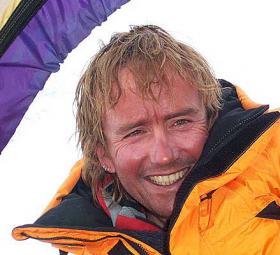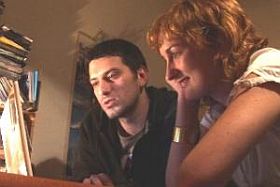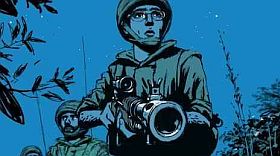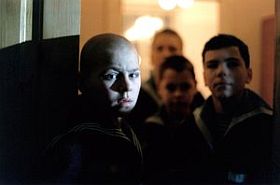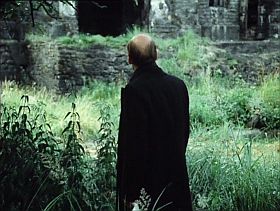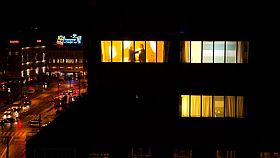Et ”tæt og ærligt dokumentarisk portræt” stod der i pressemeddelelsen fra DR Sporten om Jungs film. Og jeg glædede mig. Den sympatiske og kloge Brian Holm og den grundige og sagkyndige Niels Christian jung på opgave sammen, i patløb så at sige, om cykelløb og sygdom. Det spændte forventningerne. DR 2 sendte filmen i aftes, og jeg blev skuffet.
Filmen er bestemt seværdig, men den gør ikke arbejdet færdigt, følger ikke sporene, den lægger ud. Følger dem et stykke af vejen, men opgiver så. Ikke bare et af dem, men alle de fire, jeg fik øje på: Kirurgen, Team HTC-Columbia, Familien og især Brian Holm alene. Så altså, tæt… ok, men slet ikke tæt nok. Ærlig… ja, ja, men slet ikke den ærlighed, det dokumentariske oplæg kræver. Som jeg følgelig havde ventet.
Det med forventningerne er bogens skyld. I en scene i filmen sidder Brian Holm i en hotelseng og skriver. Det er under Tour de France sidste år. Han skriver ikke om løbet, ikke om HTC-Columbias etapesejre. Han skriver på sin bog om kræftsygdommen, om sit liv den række år med den altdominerende realitet at være diagnostiseret, opereret og efterbehandlet for tarmkræft. Den bog kender jeg på den måde, at præsten i min kirke en søndag for nogen tid siden tog den som udgangspunkt i sin prædiken og stillede den op mod dagens tekst. Han sagde, det var en god bog. En ærlig bog, en tæt bog – tror jeg, han mente.
Det med forventningerne er også prisbelønningernes skyld. Niels Christian Jung blev i 2008 af de danske sportsjournalisters forening valgt til årets mand, ”en kompromisløs graver” kaldte formanden Steen Ankerdal ham i sin motivering af valget. Og november sidste år fik han Torsten Tégners mindelegat, som gives til fremragende nordiske sportsjournalister. Nu kunne jeg sådan forberedt møde hans nyeste arbejde, hvor han godt nok ikke skulle afsløre, men gerne selvfølgelig, grave. Skaffe stof frem til en ny og vigtig film, og måske gravede han for meget, fandt for meget og kunne ikke vælge fra. Stof om sygdomsbehandlingen, om arbejdet med HTC-Columbia, om familielivet og om Brian Holm nu og tilbageskuende, biografisk.
De fire historier kommer i de ubegribelige klippevalg til at stå fuldstændig i vejen for hinanden. Først historien om kræftsygdommen. Det er den vigtigste, det ligger i titlen. Og det er en virkelig god idé at komme tilbage til Bispebjerg Hospital og møde lægen. Men denne vigtige medvirkende, som er god at lytte til, får slet ikke lov til at folde sig ud med sin store erfaring. Og han er god sammen med Holm. Hvor havde jeg gerne set en film med de to alene. Så er der skildringen af det professionelle arbejde under touren sidste år. Den genre stiller store krav i den danske dokumentarisme kontekst, og det faktum gøres der end ikke forsøg på at leve op til, så den del af filmen er nærmest overfødig. Familielivsdelen er tv håndværk, når det er mest omklamrende sentimentalt og bornert-nysgerrigt. Sønnen kommer til at fylde det hele, og en far/søn film kunne have været en mulighed, vil jeg tro, men træls at se. Endelig Brian Holm selv. Interviewet med ham er godt, hvor der mærkeligt ind imellem er plads til det, for han er god. Får som lægen bare ikke mulighed for at folde sig ud. Så hvor er ærligheden? Tætheden? Hvordan gik det med stomi-muligheden og potenssvigtet? Det sad vi da og ventede på den fine og kloge mands beretning om.
Det er jo tacklingen af ting som disse, som er den største sejr. Som jeg forstår Brian Holm, når han skriver: ”Jeg har altid godt kunnet lide udtrykket ’La flamme rouge’ – den sidste kilometer. Når man kommer til den sidste kilometer som rytter og ser den røde vimpel, der markerer indgangen til strækningen, gør det altid ondt. Kroppen er tom, og man skal virkelig bide tænderne sammen og grave dybt i kraftreserverne. Man skal kigge frem og ikke tilbage og træde det bedste, man har lært, for det afgør, om man vinder eller taber. Det er det samme i kræftforløb. Altså bortset fra at den sidste kilometer for kræftpatienter er ekstremt lang. Nærmest uendelig.”
Jeg tror bogen er bedre end filmen..
Niels Christian Jung: Den største sejr, 2010. Sendt på DR2 i aftes, produceret for DR Sporten www.dr.dk/brianholm siden indeholder scener, som ikke er med i filmen. Litt.: Brian Holm: Den sidste kilometer, People´s Press, 2009.





